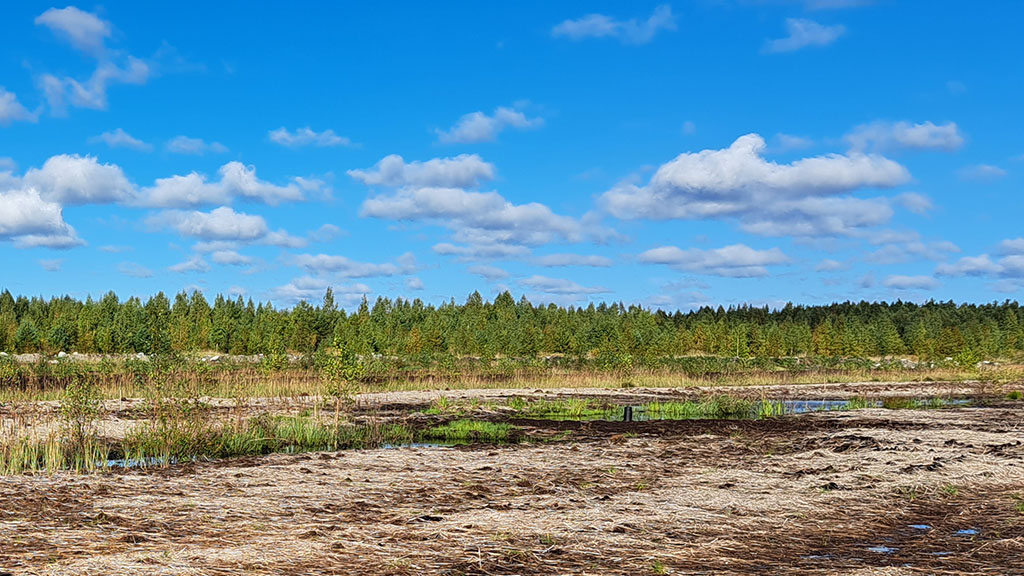New Project Explores the Potential of Carbon Trading in Areas Released from Peat Extraction
The need to reduce climate emissions in Finland and the European Union is increasing the pressure to redirect areas towards land uses that conserve carbon storages. Efficient and relatively permanent emission reductions could be achieved from the conservation of peat carbon storages if landowners had incentives to produce them through carbon trading.

Previous studies have identified peatland rewetting as a cost-effective way to reduce climate emissions compared to other options available to society. As current support schemes do not provide incentives to rewet areas released from peat production, there is a clear need for new carbon market solutions. Rewetting can be not only restoration but also the production of biomass at high water levels, i.e., paludiculture.
The EU is currently working on the certification of carbon offsets, which will set the ground rules for carbon trading by private and public operators. In the certification framework, peatland rewetting is considered part of the carbon sequestration methods of the land-use sector, i.e., carbon farming. A functioning carbon market also needs work at national and local levels. The changing market situation offers landowners new high-water-table options for the continued use of land that is being released from peat extraction, if only the operating methods and value chains can be made to work.
The ´Value from the carbon market for the next land use of peat production areas` (ArvoHiili) project, launched at the turn of the year, investigates the opportunities and constraints for carbon market activities in areas released from peat extraction in South Ostrobothnia. The aim is to identify the scientific, technical, legal-administrative, and economic prerequisites for deriving value from carbon storage and sequestration through paludiculture and mire creation. The project aims to respond to the opportunities offered by carbon trading in the context of a rapidly evolving market.
The Geological Survey of Finland and the Natural Resources Institute Finland will gather and produce data on the climate impacts of land uses that conserve carbon storages in areas released from peat production and compare it to the current regional situation of further use. Also, they will form practices for the reliable and cost-effective measurement and evaluation of greenhouse gas balances. The University of Eastern Finland will investigate the current and prospective regulation and governance of carbon credit production at former peat extraction sites and identify climate-friendly and economically beneficial value chains based on land uses that conserve carbon storages. Seinäjoki University of Applied Sciences will facilitate local cooperation of the actors in South Ostrobothnia.
The project is being carried out by the Geological Survey of Finland, the Natural Resources Institute Finland, Seinäjoki University of Applied Sciences, and the University of Eastern Finland (School of Forest Sciences and UEF Law School). The project receives funding from the European Union’s Just Transition Fund (JTF).
Further information
Liisa Maanavilja, Senior Researcher
Geological Survey of Finland GTK
liisa.maanavilja@gtk.fi
tel. +358 29 503 5045
Project introduction:
Value from the carbon market for the next land use of peat production areas (ArvoHiili)
Lasse Aro, Research Scientist
Natural Resources Institute Finland (Luke)
lasse.aro@luke.fi
tel. +358 29 532 4025
Mirella Miettinen, Senior Researcher
University of Eastern Finland, UEF Law School
mirella.miettinen@uef.fi
tel. +358 50 472 0510
Suvi Kuittinen, Postdoctoral Researcher
University of Eastern Finland, School of Forest Sciences
suvi.kuittinen@uef.fi
tel. +358 50 442 2715
Kari Laasasenaho, Senior RDI Expert
Seinäjoki University of Applied Sciences
kari.laasasenaho@seamk.fi
tel. +358 40 680 7631

